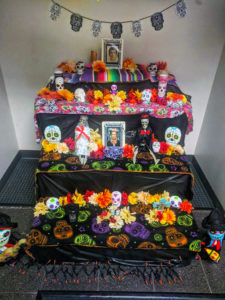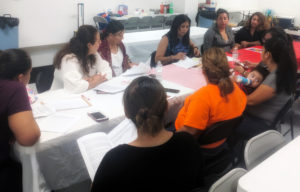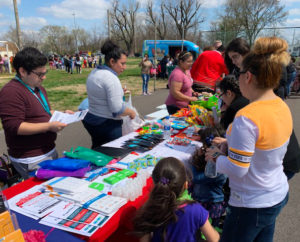UCC-related Puentes de Esperanza Finds Traditional Celebrations a Way to Raise Awareness While Serving Its Latinx Clients

This altar in the second floor lobby invites all visitors to participate in Dia de los Muertos.
A young family may bring a favorite photo of a beloved grandparent. A parent may offer the favorite dessert of a deceased child. A widower may leave a bouquet of flowers. In Mexican culture, these simple acts are part of the Dia de los Muertos (Day of the Dead) celebration, traditionally held Oct. 31-Nov. 2 to honor loved ones who have died.
At Puentes de Esperanza (Bridges of Hope), a program of UCC-related Hoyleton Youth & Family Services in Fairview Heights, Ill., staff is celebrating Dia de los Muertos during the entire month of October in order to give the larger community a chance to join the celebration. A small altar adorns the second floor lobby of the main office. It is decorated with such items as photos of loved ones, favorite flowers or foods, candles, religious items, sweet bread, and sugar skulls, many left by visitors and families Puentes serves. Puentes de Esperanza has invited everyone — Mexican and non-Mexican alike — to visit the altar and place an item on it in honor and memory of a loved one.
In this small way, Puentes de Esperanza is providing a unique service to its clients but also helping the wider community learn more about their immigrant neighbors.
Puentes de Esperanza helps Spanish-speaking residents in Southern Illinois find community resources that can help them establish citizenship, build a family, and find employment, among other services. “We are constantly placing ourselves in the shoes of our clients and thinking of how we can best support them,” says Kristen Shinn, director of community support services. “We try to honor their cultures and background through our interactions with them.”

Among the services Puentes provides is a monthly women’s club meeting.
The task can be daunting, as Shinn’s team of four hard-working advocates serves more than 600 unique individuals (not including spouses and children) each year. The language barrier — often one of the reasons people seek out Puentes’ services — can add to the obstacles.
Most of the families Puentes de Esperanza serves consider themselves Latinx, or from Latin American cultures. Luckily, most of the families are bilingual — they speak their native dialect (K’iche’, a Mayan language of Guatemala, for example) plus Spanish. “If our clients didn’t know any Spanish, it would be much more difficult for our staff to communicate with them,” Shinn says.
Many immigrant families arrive at Puentes de Esperanza’s doorstep in a state of desperation, unable to adequately navigate the system due to language barriers. They might be unable to find work, or don’t know how to fill out the appropriate forms for a particular service. Workshops help teach much of what the families need, with common topics that include Know Your Rights, Healthy Relationships, and Community Resources. Puentes helps address the physical, emotional, social, and spiritual needs of their clients during the journey to become a vibrant part of the larger community — and the clients are grateful for all the help they receive.

Puentes families pick up resources at a local event.
“The families we serve are grateful for any and all assistance,” Shinn says. “It is always nice to read or hear about the wonderful things our clients say about my team. I know how hard they work and I know that they are doing the right thing when I hear feedback like that from our clients.”
And although the staff size seems woefully small, Puentes de Esperanza takes pride in filling “a gap where others can’t or won’t,” says Shinn. “We often collaborate with community partners to make a bigger impact and support individuals. For example, we will often create a workshop when we notice a trend in a topic that we’re explaining to families.”
In today’s climate of open hostility to immigrants from Central and South America, trending workshops of late have included Guardianship, Power of Attorney information, and Know Your Rights.
“We have tried to be more diligent when working with individuals to ensure that their families are protected,” Shinn says. “For individuals who are required to participate in the ICE Intensive Supervision Appearance Program, we encourage them to contact a [Puentes’] partner to accompany the individual to the appointments. This is meant to ease anxiety, provide comfort, and deter any maltreatment or detention of the individual.”
In the end, Shinn says, the people served by Puentes de Esperanza are like all families in the United States. “The families that we serve add to the diversity of our country. The individuals we work with share the same hopes and dreams each of us have to live a happy and healthy life,” she adds. “We want to see the families thrive just as we would hope every other individual will thrive.”
Join Our Mailing LIst
"*" indicates required fields
Follow on Facebook
Hoyleton’s ‘Be the Light’ Honors Volunteers, Raises $94,000 for Programming - CHHSM
www.chhsm.org
Hoyleton (Ill.) Youth and Family Services lit up the room Feb. 28 during its 42nd Annual Hoyleton Honors celebration. With the theme of “Be the Light,” Hoyleton highlighted the numerous ways the o...